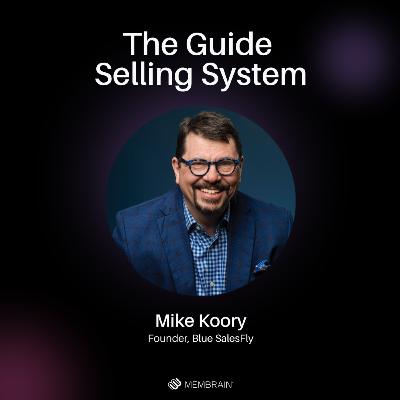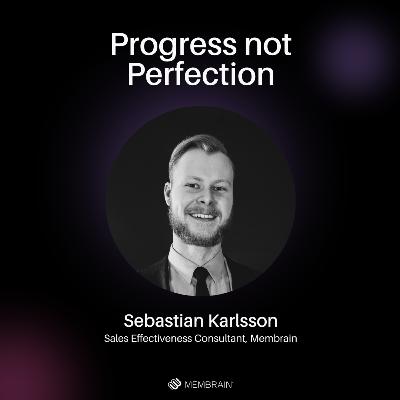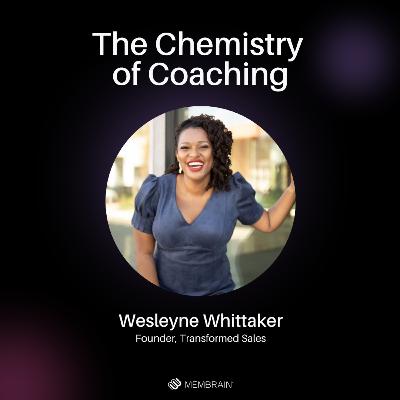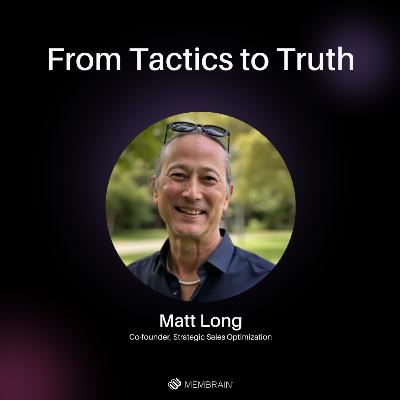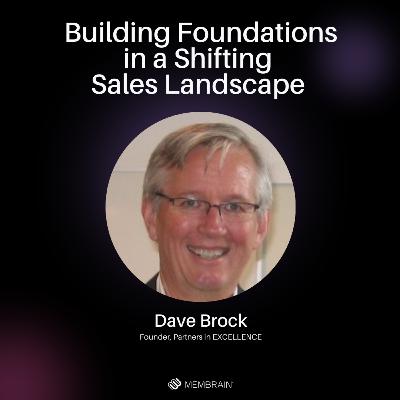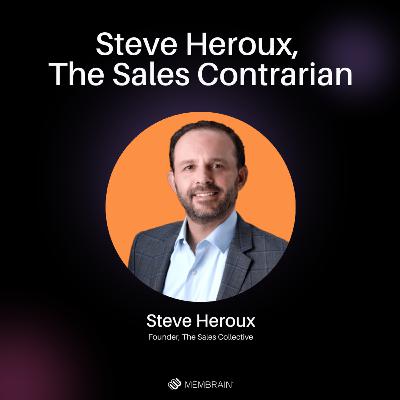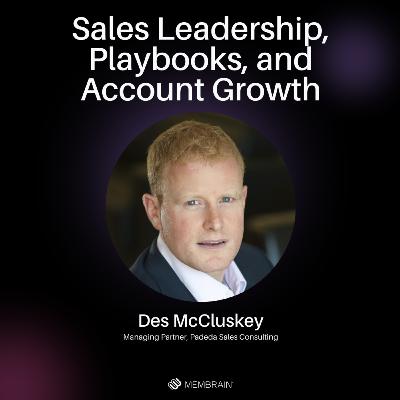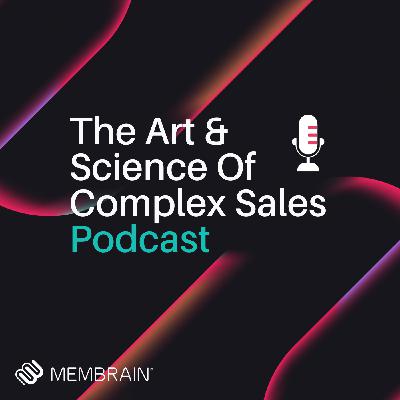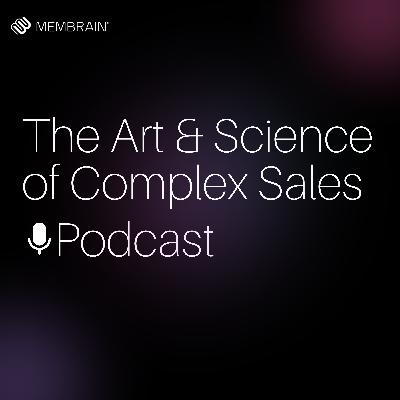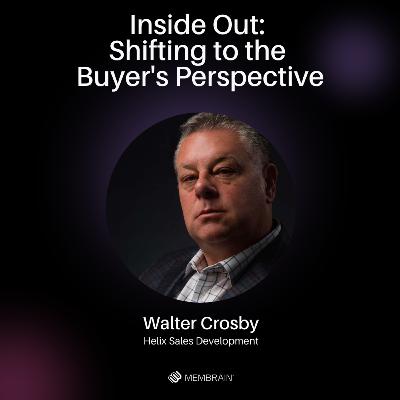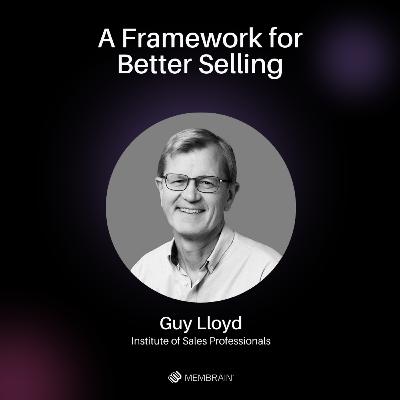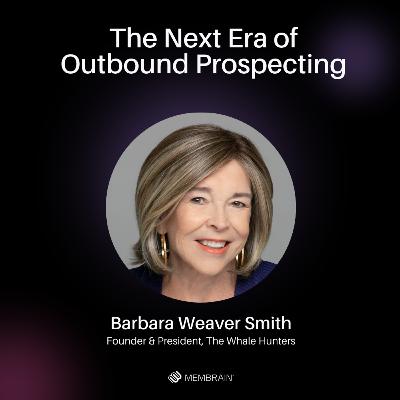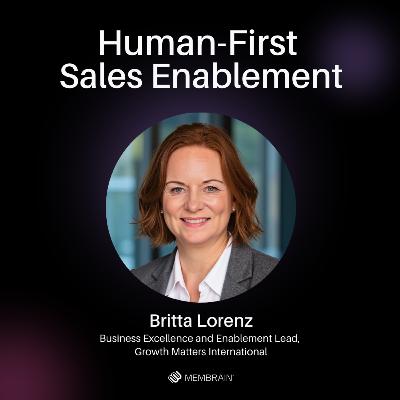Discover Art & Science of Complex Sales
Art & Science of Complex Sales

130 Episodes
Reverse
In this episode of The Art and Science of Complex Sales, Paul Fuller is joined by Kelly Riggs, sales performance coach and founder of The Business LockerRoom. They dig into the realities of leadership, coaching, accountability, and why many sales teams fail to reach their full potential. Kelly challenges conventional thinking and offers practical guidance for creating stronger, more effective sales cultures.The Biggest Lie Sales Managers Tell Themselves (01:32)Kelly reveals that one of the most damaging beliefs among sales leaders is "I don't have time." He explains that many managers carry an efficiency mindset from their days as top performers, believing they can juggle development alongside administrative tasks. However, real leadership demands an intentional shift in time investment. Coaching cannot be rushed. To lead effectively, managers must step away from task juggling and prioritize one-on-one development, even if it feels inefficient.Accountability is a System, Not a Personality Trait (10:18)Kelly emphasizes that accountability does not stem from personality alone but from structured leadership systems. Many organizations hope to hire self-accountable reps and avoid the hard work of coaching. This rarely works. Accountability must be built into the culture by leaders who understand their role in reinforcing it. He notes that when managers create clarity, support, and regular coaching rhythms, accountability becomes a shared standard rather than a punitive concept.The Hidden Cost of Keeping Toxic High Performers (18:17)Kelly outlines the steep cultural and operational costs of retaining top sellers who undermine team morale. These individuals often hold leadership hostage by leveraging their revenue contributions. Kelly warns that while letting them go can feel risky, keeping them signals to the rest of the team that toxic behavior is acceptable. The result is a deteriorating culture, operational bottlenecks, and lost A-players. Leaders must confront this behavior early and decide whether the person can adapt or needs to exit.Sales Hiring and Team Design in the AI Era (23:46)Despite the rise of AI and automation, Kelly argues that the fundamentals of sales team design remain consistent. Tools can augment performance, but they cannot replace the core human aspects of sales. Selling is still about guiding buyers through complexity, building trust, and influencing decisions. Organizations that rely solely on tools without training for emotional intelligence, adaptability, and buyer alignment will fall behind. Salespeople are needed more than ever—not less.
In this episode, Paul Fuller is joined by Mike Koory, founder & CEO of Blue SalesFly, to talk about his new book, The Guide Selling System. Mike shares how traditional sales tactics often miss the mark by focusing on persuasion rather than understanding. His system encourages salespeople to act as guides, helping customers move from where they are to where they want to be.Mike introduces the idea of using a structured, systems-based approach in sales, inspired by quality practices from other industries. He emphasizes the importance of asking better questions, building trust, and shifting the mindset from selling to guiding.He also talks about “TOPO map”, which focuses on Threats, Obstacles, Problems, and Opportunities as a way to reframe discovery and create more meaningful conversations. The discussion highlights how real change in sales happens not through high-pressure tactics, but through clarity, consistency, and collaboration.
In this episode, Sebastian Karlsson, a Sales Effectiveness Consultant at Membrain, joins Paul Fuller on the podcast to discuss how small, consistent habits and clear processes can make a big difference in both hitting targets and building confidence. Seb explains why having a sales process is like having a checklist. It helps teams avoid repeating mistakes, scale beyond just one top performer, and stay focused. He shares a personal story about starting small with fitness and how that idea translates to improving in sales.He also talks about the uncomfortable but powerful habit of watching recordings of his own sales calls. For him, it’s the fastest way to improve.The conversation is all about making progress one step at a time, keeping things human, and learning how to enjoy the process.
In this episode of The Art and Science of Complex Sales, Paul Fuller is joined by Wesleyne Whittaker, founder of Transformed Sales, a former chemist turned international sales leader. The conversation unpacks what it means to transform sales teams from within, with a sharp focus on leadership accountability, mindset and skill-building, especially in the often-overlooked world of manufacturing and distribution sales.Wesleyne shares her journey from lab work to sales consultancy, revealing how her analytical background shaped a science-meets-art approach to solving sales challenges. She dives into the critical gaps in sales enablement within industrial sectors and shows how curiosity, mindset resilience and coaching cultures drive real performance improvement.With real-world examples including a powerful story of a leader who went from being on a performance plan to earning a spot at President’s Club, this episode challenges traditional views on sales training and emphasizes the deep, human work that goes into transforming a team.
In this episode of The Art and Science of Complex Sales Podcast, we’re joined by Matt Long, co-author of Winning Faster and co-founder of Strategic Sales Optimization. Together with host Paul Fuller, Matt shares the lessons from his 25-year journey through enterprise software sales and why structure, not improvisation, is what unlocks consistent success in complex deals.The Shift from Tactics to Strategy (06:41)Matt reflects on his evolution from a tactical sales engineer into a strategic partner in enterprise deals. He unpacks how technical roles often stay too focused on immediate tasks, and why stepping back to analyze the full sales motion is where real selling begins. This shift laid the foundation for everything he now teaches.Breaking Down the MOVE Framework (11:19)At the heart of Matt’s methodology is the MOVE Framework: Motive, Opportunity, Value, and Engagement. Each component helps sales teams bring structure to chaotic buying cycles. He breaks down how to discover true business motives, map power and influence, articulate differentiated values, and engage customers meaningfully through every interaction.Why Better Demos Mean Faster Wins (36:05)Matt explains how weak demos lead to excessive proof-of-concepts and lost deals. He shares how aligning demos with discovery and tailoring value to different power centers speeds up decision-making and improves close rates. It’s not about more features but about being more relevant.
In this episode of The Art and Science of Complex Sales, Paul Fuller chats with Brent Long about the mindset behind his new book The Greatest Sales Question Ever Asked. Brent shares how his personal approach to selling has evolved, and why honest, heart-led questions are the most powerful tool a salesperson can use.What Inspired The Greatest Sales Question Ever Asked (02:32)Brent reveals how the book was born from decades of coaching and a growing frustration with vague sales advice. Tired of hearing "ask better questions" without any clarity on what those questions were, Brent set out to define them. The book distills his years of field-tested coaching into a guide that helps salespeople build trust, ask with purpose, and sell without compromising who they are. It also reflects his personal faith and the belief that great salesmanship starts with truth and intention. Brent shares how the encouragement of clients and the challenge from his wife gave him the final push to complete the project, even when revisiting some difficult personal stories.From Tactics to Truth in Sales (07:13)Brent shares how his early career was driven by competitiveness and control. He was skilled enough to dominate conversations, win deals, and even manipulate people while still making them feel good about it. But over time, he began to feel the disconnect between performance and purpose. That turning point led him to rethink what success in sales really looks like. Instead of pursuing quick wins, he shifted toward serving others with genuine care. This part of the episode digs into the internal conflict many sellers face and how Brent reframed sales as an act of service rather than persuasion.The Three Truths of a Cold Call (11:57)In one of the most practical takeaways from the episode, Brent introduces his “Three Truths of a Cold Call” framework. Instead of using tricks or clever intros, Brent teaches salespeople to lead with honesty: acknowledge that it is a cold call, admit you might not be calling at the best time, and ask one thoughtful question. This opens the door to authentic conversations and lowers resistance. He shares how this approach has helped clients who were previously stuck break through with even the most resistant prospects. Brent also explains how truth-based selling builds long-term courage and confidence—paying salespeople with emotional momentum before any commission arrives.Brent's book can be found here.
In this episode of The Art and Science of Complex Sales, Paul Fuller sits down with Dave Brock, founder of Partners in EXCELLENCE. They unpack the challenges and contradictions facing modern sales teams—from cultural drift to leadership dysfunction—and explore what it really takes to build resilient, high-performing organizations in today’s environment.High Performers Play the Long Game (25:28)What do the best companies have in common? Dave shares lessons from top-performing organizations across industries. These teams focus on fundamentals, long-term leadership, and curiosity—not shortcuts. He emphasizes that sustained success is built on depth, not hacks or vanity metrics.High Performers Play the Long Game (25:28)What do the best companies have in common? Dave shares lessons from top-performing organizations across industries. These teams focus on fundamentals, long-term leadership, and curiosity—not shortcuts. He emphasizes that sustained success is built on depth, not hacks or vanity metrics.Rethinking Playbooks and Performance (36:59)Sales playbooks are helpful—but not when they become cages. Dave and Paul discuss how top reps use playbooks as foundations, not scripts. Real performance comes from learning, adapting, and thinking critically. They explore why flexibility, common language, and trust are more important than rigid rules in today’s complex sales environments.
In this episode of The Art and Science of Complex Sales, we’re joined by Tony Cross, CEO of Growth Matters International. Tony shares how sales managers can be the most powerful lever for sales transformation. The conversation focuses on how to lead teams through uncertainty, coach toward customer buying behavior, and create practical momentum through structured conversations and frameworks. Tony also introduces his "Chalk and Talk" initiative, a live, collaborative coaching experience designed to foster strategic action.Coaching Through Uncertainty (03:38)Tony explains how sales managers can cut through the noise by staying focused on the fundamentals. Rather than "getting back to basics," he advocates reinforcing foundational one-on-one coaching that helps reps guide customers through complex buying decisions. Uncertainty is high, but clarity can be created through strong leadership.Aligning with the Buying Process (06:08)The episode explores why sales teams need to understand how buying decisions are made inside customer organizations. Tony discusses using a draft buying vision to collaborate with buyers and ensure proposals speak to everyone involved, not just the primary contact. This approach builds trust and improves win rates.Pipeline Coaching with the ICE Model (15:55)Tony introduces the Identify, Clarify, Explore (ICE) model as a simple yet powerful framework for coaching reps on pipeline health. He explains how sales managers should move beyond metrics like coverage ratios and instead diagnose pipeline challenges by looking at value, volume, velocity, and deal shape.
Sales excellence starts with purpose, is driven by process, and grows through self-awareness. It’s about aligning personal motivation with meaningful business impact. Zack Bower and Nick Massaro from Membrain unpack what sales means to them, why process thinking matters, and how Membrain helps them sell with greater clarity and consistency. This episode blends introspection and practical insight to show how structure leads to better results for individuals, teams, and businesses alike.
Steve Heroux, the author of "The Sales Contrarian," joins us for an eye-opening chat about shaking up the sales world. Steve isn't just challenging tired sales norms—he’s flipping them on their head with his groundbreaking book that’s captured the attention of sales leaders and salespeople alike. He takes us behind the scenes of his unexpected bestseller, highlighting the role of leadership, or often the missteps of it, in shaping sales dynamics. With fascinating anecdotes, including a memorable shoutout to Daniel Pink, Steve spotlights the harmful perceptions surrounding sales professionals and argues passionately for a leadership shift to truly elevate the profession.Get a copy of the book here.
Join us as we explore the complexities of B2B sales with Des McCluskey, Managing Partner of Padeda and former Sales Director at Johnson & Johnson. Des shares practical insights on building effective sales playbooks, the critical role of first-line sales leaders, and navigating complex sales cycles. Drawing from experience in medical devices, professional services, and financial services, he provides actionable strategies on sales enablement, coaching, and account management that sales leaders can apply immediately.The Cultural Gap in Sales Playbooks (6:09)Des highlights a fundamental difference between American and European sales approaches. While U.S. teams embrace structured sales playbooks, modeled after football plays, European teams favor a more flexible, improvisational style inspired by soccer. This cultural contrast makes implementing playbooks a challenge in Europe, requiring a shift in mindset and execution.The Rise of Bureaucracy in Sales Processes (14:10)Des discusses how an increase in technical buying influences and complex procurement systems is slowing down deal closures. Even with verbal approval from decision-makers, deals are now delayed by an average of six weeks due to finance checks and system inefficiencies. This trend creates forecasting challenges for sales teams, emphasizing the need for more proactive post-approval management.The Power of Retention Squads (23:35)Des introduces “retention squads”—cross-functional teams dedicated to managing and growing existing accounts. Unlike traditional account management, these agile, project-based teams engage multiple stakeholders to maximize renewals and drive account expansion. By fostering deeper relationships and broader outreach, retention squads help organizations secure long-term growth and uncover new opportunities.
In this episode, Leslie Venetz founder of The Sales-Led GTM Agency joins us for a captivating discussion on her journey into the sales profession and her pivotal role in the Women Sales Experts Conference. Once viewing sales as merely a temporary gig, Leslie discovered her true passion when she embraced her ability to help people solve their problems.The Soul-Sucking Impact of Bad Data (10:04)Leslie discusses one of the biggest challenges sales teams face—poor data quality. She explains how bad data demoralizes sales reps, turning outreach into a frustrating and ineffective process. Leslie emphasizes that having accurate, enriched data combined with the right tech stack not only improves outreach success rates but also alleviates the mental fatigue caused by ineffective efforts.The Power of Signals in Sales Tech (14:04)Leslie highlights how modern sales tech has transformed outreach by leveraging signals—indicators like new hires, financial shifts, or market events. She explains that the true power lies in connecting these signals to build timely, relevant, and personalized outreach. By integrating these insights, sales teams can craft pitches that resonate with prospects' current challenges and priorities, making outreach significantly more effective.Discovery Meetings: The Final Step of Top-of-Funnel (30:11)Challenging a common misconception, Leslie argues that discovery meetings should be seen as the last step of top-of-funnel, not mid-funnel. She explains that this stage is where sales reps earn the right to advance conversations by actively listening and understanding prospects' needs. Leslie criticizes the practice of turning discovery meetings into box-ticking exercises, emphasizing that meaningful dialogue is what truly qualifies prospects for the next step.
Key Highlights Include: Having empathy in relationships (9:06)Processes in sales (11:56)Communicating effectively with a buyer (20:28)Building processes (24:51)In addition, Ian provides suggestions and techniques. to ensure effective communication with buyers, such as the importance of asking questions to understand the buyer's definition of terms like "big problem." Tune in to this episode of the Art and Science of Complex Sales Podcast with Ian to learn tips and tricks to ensure effective communication with buyers!
In the latest episode of the Art and Science of Complex Sales podcast, Paul Fuller sits down with Mike Koory, the founder and CEO of Blue Sales Fly, a company dedicated to helping sales teams and professionals transform and succeed. Mike has a wealth of experience in the sales industry and offers valuable insights on what it takes to be successful in this field.According to Mike, sales is all about solving problems and advancing the business of clients through the transfer of skills, solutions, or products. Successful sales involves understanding the needs and challenges of clients and finding creative solutions to meet those needs. In the interview, Mike shares his journey into the sales industry and the valuable lessons he learned along the way. He emphasizes the importance of building relationships, adapting to change, and constantly learning and improving in order to succeed in sales.Highlights- Start with credibility- How we've changed the way we value time- The Guide Process- The Art and Science and how it's connected- 44% will go to an existing vendor to solve a problem- Successful Sales Transformations- Governance around behaviors- Goals in SpreadsheetsAre you ready to transform your sales skills and take your career to the next level? Tune in to the latest episode of the Art and Science of Complex Sales podcast. This is a can't-miss episode for anyone looking to elevate their sales game and achieve even greater success.
In this episode of The Art and Science of Complex Sales, Paul Fuller sits down with Walter Crosby, CEO of Helix Sales Development to unpack the core ideas behind his book, Inside Out, and why sales teams often struggle to fit inside structured operating systems like EOS (Entrepreneurial Operating System).Together, they break down how to integrate sales into the business operating rhythm without turning selling into a rigid, internal process, and how to pivot to a buyer first approach that qualifies earlier and lands better.Sales Should Not Sit Outside the Operating System (03:11)Walter explains why he wrote Inside Out as a practical guide for leaders who run EOS and want sales to stop feeling like the “outside team.” EOS creates strong internal clarity and structure, but sales has to operate in the buyer’s world, where customers do not care about internal language, frameworks, or meeting rhythms. The goal is to integrate sales into the operating system while still equipping sellers to lead customer conversations around real problems.The Buyer First Pivot Fixes the Standard Sales Process Dilemma (06:57)Walter argues that most sales processes fail when they are built around pitching and chasing. Instead, teams need a consistent baseline process that prioritizes the buyer journey: uncovering whether a problem exists, whether it is compelling, whether there is urgency, budget, and a clear decision path. The shift starts by dropping internal agenda and getting the buyer talking, listening for what matters, and helping them think differently about their problem before any demo, proposal, or solution talk.The Sifter Message Creates Consistency and Qualifies Earlier (17:24)Walter introduces the sifter message as the company sales story that keeps teams aligned without turning reps into scripted robots. The business provides a shared narrative, positioning, and templates so five sellers do not tell five different stories. He also recommends leading with common ground, naming that most solutions are similar, then focusing on the small difference that matters to the buyer. This approach builds trust fast and helps teams earn a “no” earlier, so they stop wasting time on deals that will not close.Listen to the full conversation with Walter Crosby and explore practical ways to build a buyer-first sales motion that qualifies earlier, stays consistent, and drives better outcomes.
In this episode of The Art and Science of Complex Sales, Paul Fuller has a conversation with Guy Lloyd, Managing Director of the Institute of Sales Professionals, about why sales needs more respect, better standards, and clearer career paths in today’s complex B2B world.They cover the cultural stigma around sales in the UK, why selling is a service profession, and how the ISP framework gives teams a practical roadmap for growth.Sales in the UK Is Getting Harder and the Profession Needs a Reset (00:19)Guy says UK B2B deals are growing more complex, buyers are more cautious, and AI is adding both opportunity and confusion. The bigger issue is perception. Sales is still viewed negatively from the outside, even though salespeople love the career. That gap has to close if teams want stronger results.Sales Is a Service Profession, Not a Persuasion Game (02:29)From early customer facing jobs to global IBM leadership, Guy has always seen sales as helping customers improve their business. He compares selling to medicine. Great sellers diagnose, guide, and create real outcomes, not pressure deals over the line.The ISP Framework Gives Sellers a Map for Development (11:09)Guy explains the ISP sales framework and its four quadrants: core sales skills, business sales skills, leading self, and leadership. It scales by role, so junior reps are measured on realistic competencies and leaders on advanced ones. The framework powers assessments, training endorsements, and clearer standards across the profession.A Living Framework That Clarifies Career Growth (22:30)Guy says the framework is designed to evolve as selling changes, whether driven by AI, new buyer behavior, or new expectations. That keeps standards relevant and training aligned to today’s reality. Just as importantly, it replaces vague career development with clear signposting. Sellers can see what’s required at the next level, build those skills intentionally, and grow with confidence instead of being told they are “not ready yet” without a path forward.Listen to the full conversation with Guy Lloyd and discover how a shared standard can build pride in the profession and turn sales development into a real career roadmap.
In this episode of The Art and Science of Complex Sales, Paul Fuller sits down with Barbara Weaver Smith, founder of The Whale Hunters, to challenge one of sales’ most sacred habits: cold email.Together, they explore why AI is accelerating the decline of outbound email, what replaces it in complex B2B selling, and how sales teams can adapt by leaning back into reputation, community, and high value human outreach.Email Is Dead: The Future of Cold Prospecting (00:50)Barbara lays out her “email is dead” hypothesis for cold prospecting. She argues that sellers are using AI to write more outreach, while buyers are using AI to filter and screen it, so cold emails are increasingly blocked or ignored. As companies tighten external email access and move communication into internal platforms, even one to one personalized emails will lose viability. Her takeaway is that teams need to shift now toward human first channels, like referrals, face to face connection, and LinkedIn based engagement, with KPIs reflecting real conversations over email volume.Build Authority and Community on LinkedIn (09:11)Barbara argues that as cold email loses effectiveness, authority becomes the new access point. Companies can post smart content, but in large account selling, individual reps also need a visible point of view. She encourages sellers to show up on LinkedIn like trusted experts, not broadcasters, joining real conversations, commenting thoughtfully, and becoming familiar to the people they want to meet.From there, she shifts to community as the future of prospecting. Instead of chasing strangers, reps should nurture circles of buyers who care about the same industry issues. Pick a topic you genuinely want to learn and talk about, stay informed, and participate consistently. Over time, that presence builds trust, warms relationships, and creates opportunities that cold outreach cannot.Multi Touch Prospecting and the Culture Shift Beyond Email (19:51) Barbara says leaders need to reset how teams prospect now that cold email is losing power. The shift starts by replacing an email first mindset with a consistent multi touch sequence. Email can still be one touch, but only as part of a broader rhythm that includes personal video, phone, voicemail, LinkedIn engagement, and marketing supported content.She reminds sales leaders that meeting someone new takes time. Even top reps need 9 to 10 meaningful touches, and newer reps may need 12 to 15. That only works if every touch is purposeful and clearly tied to who the buyer is. No generic AI spam. Hyper personalization has to be real, not automated flattery.Her point is simple. The future is not fewer touches. It is better touches, spread across channels, with patience and precision.Listen to the full conversation with Barbara Weaver Smith and discover how to stay ahead of the shift by building authority, creating community, and leading with high value human outreach in a world where cold email no longer opens doors.
In this episode of The Art and Science of Complex Sales, Paul Fuller sits down with Britta Lorenz, Business Excellence and Enablement Lead at Growth Matters International, to explore what great enablement really means in complex sales.Together, they unpack why sales enablement must start with humans not tools, how coaching becomes the real force multiplier for performance, and how leaders can balance AI efficiency with the trust and presence that only people can bring.Enablement Maturity Starts with Listening and Data (04:16)Britta says great enablement starts by meeting teams where they are. Before rolling out tools, leaders must understand maturity, skills, and process alignment. She begins with deep listening to reps and managers, then validates insights with data like activity levels, conversion rates, touchpoints, and asset usage to spot real gaps.Sales as Meaningful Meetings and the Role of Coaching (09:40) Britta defines sales as a progression of meaningful meetings built on trust and clarity, not pressure to close fast. She connects that idea to leadership too. Training helps, but coaching creates the habits, ownership, and confidence that drive consistent performance.Coaching as the Force Multiplier and Why the Human Core Still Wins (13:36) Britta calls coaching the multiplier that turns knowledge into behavior. It gets skipped because many managers were never taught how, and results feel slow in a fast world. AI can speed up prep and remove busywork, but it cannot replace presence, emotional intelligence, and trust in the meeting itself.Listen to the full conversation with Britta Lorenz and discover how to build human first sales enablement that uses AI to accelerate the work, while coaching and meaningful meetings drive real performance.
In this episode of The Art and Science of Complex Sales, Paul Fuller sits down with Janice B. Gordon, founder of Scale Your Sales, to explore how revenue teams can become truly future fit.Together, they break down why most organizations still rely on outdated, internally focused processes, why customer excellence must drive every decision, and how data informed coaching can unlock the full potential of every seller on the team.Becoming an Outside In Organization (2:08)Janice reveals why so many companies still make decisions based on internal assumptions rather than customer reality. She explains how traditional stage gated processes create blind spots and why leaders should constantly ask one question above all: What is the impact of this decision on the customer? By strengthening feedback loops, increasing customer conversations, and bringing frontline insights into strategic discussions, organizations can finally operate the way customers need them to.The GTM Skills Crisis: Business Acumen and Adaptability (11:16)Janice highlights the widening gap between modern buyer expectations and the skills revenue teams currently possess. While adaptability is crucial, she argues it cannot function without strong business acumen. Sellers must learn to interpret complex decision making units, analyze financial implications, and lead high level conversations across stakeholders. Through role play, mutual action planning, and scenario work, teams can build the strategic muscles required for today’s B2B environment.Coaching Managers to Transform Team Performance (22:47)Janice emphasizes that managers are the true leverage point in any sales organization. Yet most have never been taught how to coach effectively. She outlines how predictive assessments reveal individual seller gaps and how data informed coaching helps managers shift from deal coaching to people coaching. When leaders develop the mindset, language, and consistency to coach every rep, teams move from relying on a top twenty percent to building a strong, high performing majority.
In this episode of The Art and Science of Complex Sales, Paul Fuller sits down with Marylou Tyler, author of Predictable Revenue and Predictable Prospecting, to explore how her frameworks have evolved in the age of AI. Marylou shares how sales teams can embrace agentic AI, systems of specialized, single-task agents, to reduce busywork, boost quality conversations, and scale smarter.Together, they unpack how automation and LLMs are reshaping outbound strategies, where human sellers still matter most, and what it means to build a digital twin of your sales expertise. This episode blends deep technical insight with a clear-eyed view of what still makes great salespeople indispensable.Precision Outreach and Early Warning Signals in the Pipeline (12:47)Marylou Tyler breaks down how AI transforms both outbound outreach and pipeline management by moving beyond volume-based tactics toward personalized, signal-driven engagement. She explains how AI can analyze individual prospects—understanding their preferences, timing, and level of awareness—to create custom outreach sequences instead of one-size-fits-all campaigns.She also discusses the power of micro signals in the sales pipeline. From a lack of response to subtle changes in stage velocity, AI agents can now flag issues early and provide context around what’s stalling a deal. By identifying these patterns, sales teams can intervene faster, course-correct, and increase the likelihood of closing.Building an Army of AI Agents with Shared Context (24:06)Marylou Tyler explores the future of agentic AI in sales by envisioning a system of interconnected AI agents, each responsible for a specific part of the sales process. To work effectively together, these agents must operate under a shared context protocol that prevents miscommunication—just like a game of telephone can distort a message, AI systems can easily lose clarity without consistent guidelines.She references emerging protocols like Anthropic’s MCP and discusses the importance of using trusted tools or building custom systems to maintain integrity and alignment. As AI evolves rapidly, Marylou questions the relevance of traditional publishing and instead envisions dynamic, updateable frameworks delivered through AI-native formats.Why Humans Still Matter in a Tech-Driven Sales World (29:02) Marylou Tyler reflects on the accelerating pace of change in sales and reinforces the enduring value of human connection. Even in an AI-augmented environment, she argues, complex B2B sales still require trust, empathy, and real conversations. Sales professionals are not being replaced—they’re being called to elevate.She emphasizes the need to invest in training at the individual level, not just through broad team initiatives. With AI now enabling personalized feedback loops and skill development, the future of sales belongs to those who can combine data with deeply human conversations.



